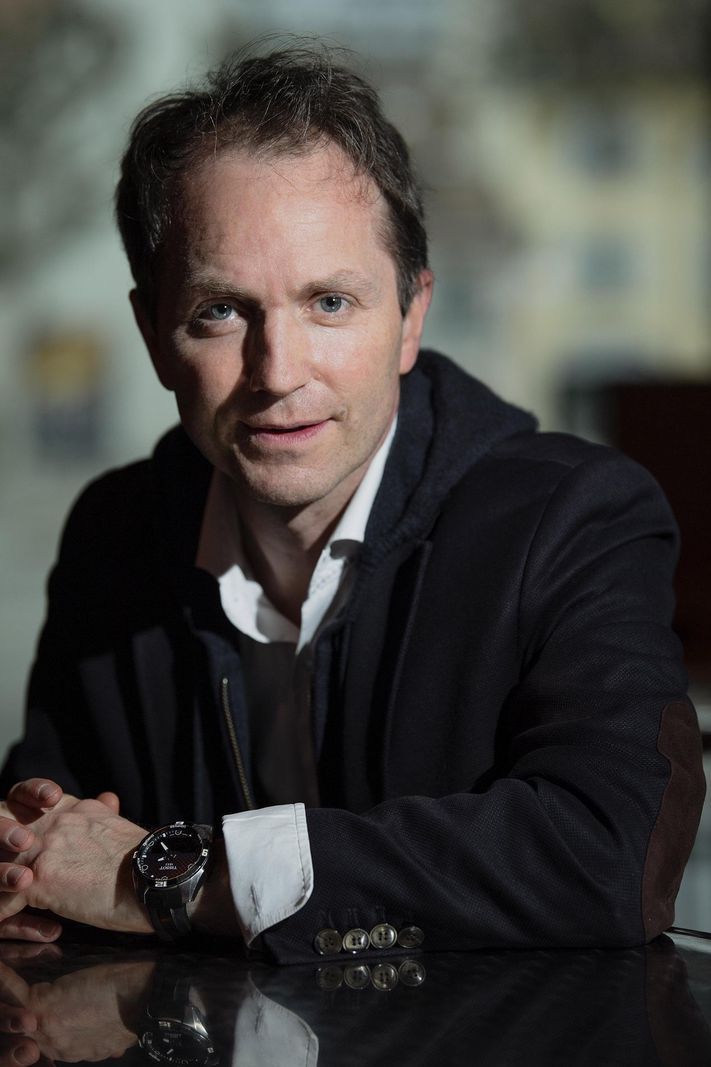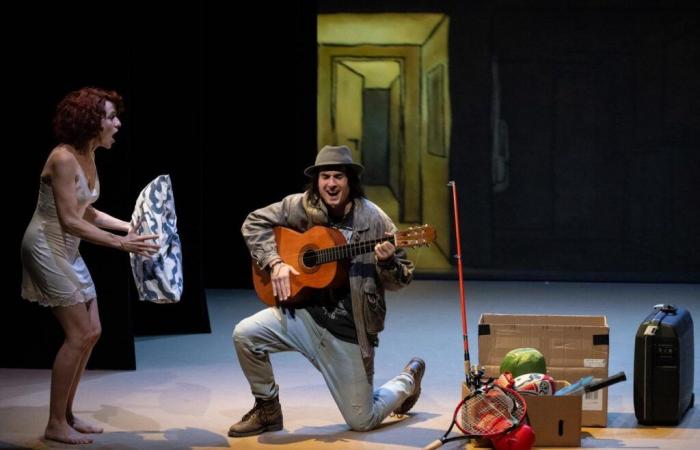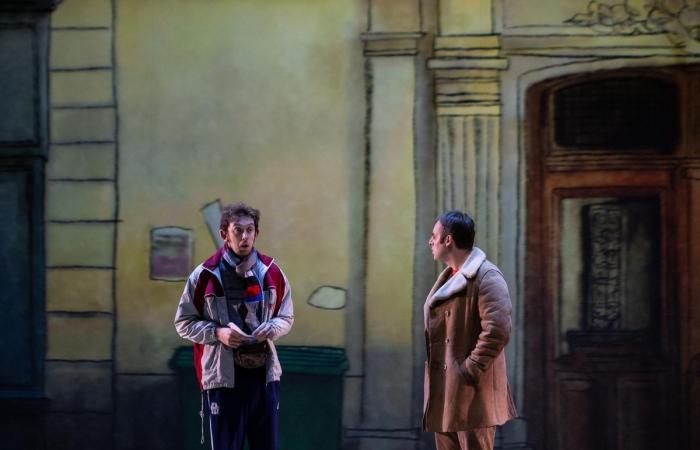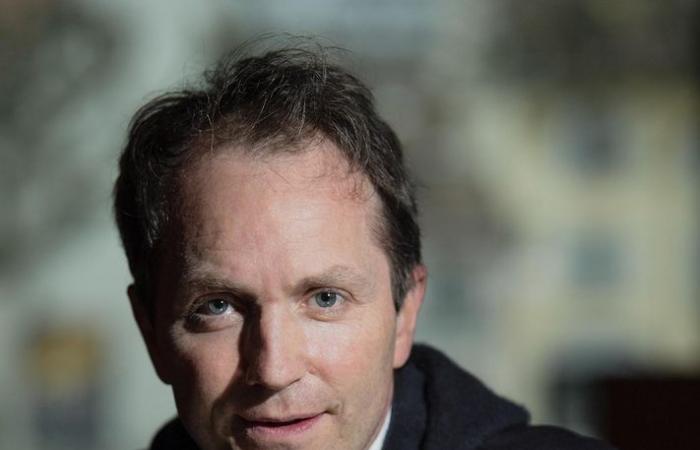Carouge Theater –
“The Crisis” by Coline Serreau passes the stage test
Jean Liermier directs the theatrical adaptation of a successful film. A show which will also be given in Kléber-Méleau.
Bertrand Tappolet
Published today at 2:51 p.m.
Eight actresses share the bill for “The Crisis”.
CAROLE PARODI
Subscribe now and enjoy the audio playback feature.
BotTalk
- The film released in 1992 had almost 4 million admissions.
- Coline Serreau and her son created this adaptation for the theater.
- Jean Liermier surrounded himself with actors familiar with Carouge.
“The Crisis”, an emblematic social comedy by Coline Serreau, takes over the stage of the Théâtre de Carouge under the direction of Jean Liermier in a world premiere with four actresses and as many actors. Including Romain Daroles in the role of Michou, a clingy but big-hearted homeless man. Adapted for the theater by the filmmaker and her son Samuel, this tragicomic work illuminates with renewed acuity the fractures in our society. Between biting satire and disarming tenderness, this stage version explores contemporary flaws while offering a subtle reflection on the human condition.
At the heart of the plot, Victor (Vincent Lindon in the cinema, Simon Romang here), a model legal advisor, sees his life turned upside down in one day: his wife leaves him, his company fires him, and those around him, indifferent, turn on him. back. This thunderclap begins a plunge into the absurdity of an implacable world where human relationships and solidarity seem contaminated by a chilling individualism. Jean Liermier infuses this descent into hell with a vibrant energy, where each painting acts like a magnifying glass on our paradoxes.
Shock duo
Victor embodies the modern castaway, the man who struggles against a merciless current. Jean Liermier describes this journey as an initiatory fable: “Victor is like a salmon trying to go up the river. But to rebuild himself, he must first abandon a part of himself and learn to meet the other.” This idea of necessary abandonment, at the heart of Victor’s narrative arc, finds universal resonance in a world in search of meaning.
Opposite Victor, Michou (Patrick Timsit yesterday on the big screen, Romain Daroles today on stage), a cheeky homeless person and everyday philosopher, overturns the codes of master-servant relationships inherited from the classics. “The Victor-Michou duo is reminiscent of Sganarelle and Dom Juan, but in a social and contemporary version,” observes the man of the theater. With his scathing retorts and his corrosive humor, Michou acts as a mirror for Victor, exposing his failings and his illusions.
Michou (Romain Daroles) and Victor (Simon Romang).
CAROLE PARODI
One of the most striking scenes of their relationship is this moment where Michou, pressed by Victor to tell the truth, blurts out: “If you didn’t have money, then frankly, I would never have had the idea to follow you eh…” Far from being a caricature, this declaration, brutal but honest, reveals a humanity steeped in contradictions. Michou, both accomplice and revealer, embodies this implacable truth which disturbs but liberates. For the director, this does not mean that Michou is not attached to Victor, on the contrary paradoxically. “Michou plays a naive person, and as he says himself, he can’t help but say things that shouldn’t be said…”
Tragicomic
In this tragicomic fresco, each character offers a facet of our contemporary struggles. Victor’s mother – Maria Pacôme at Serreau, Brigitte Rosset at Liermier –, in an anthological monologue, claims her right to freedom in the face of her son, her daughter and her husband whom she leaves: “For thirty years, I I only lived for you, only through you, so you will allow me, for once, to mind my own business before yours.” This refusal of marital conventions then becomes a universal cry for women in search of autonomy.
Jean Liermier’s direction sublimates these trajectories with ingenious and fluid scenography by Rudy Sabounghi. Thirty-six settings follow one another seamlessly, creating a space where time and space seem to intertwine. “In the theater, live performance gives a unique intensity to the dialogues. Certain emotions, which cinema suggests, take on a raw, immediate force here,” underlines the director.
Multiple laughter
The theater, far from trying to compete with the cinema, here offers a different, more immersive experience. The dialogues, played live and not fixed, take on a more intense dimension, where humor acts like a double-edged sword: awakening, but it can also heal. “This ambivalence is essential in Serreau’s writing,” insists Liermier. And it is precisely this mixture of humor and seriousness that gives this adaptation all its power.
“The crisis”, beyond its title, is not just a bitter observation. It offers hope, that of possible transformation, of renewal. Victor, confronted with his own limits, ends up opening up to the world thanks to his meeting with Michou and his family. This opening, although painful, becomes the engine of personal reconstruction. “There is always in human beings a capacity to dream and to change,” says Liermier. This is one of the essential messages of the play.”

Jean Liermier, director of the Théâtre de Carouge and director of “The Crisis”.
CAROLE PARODI
With this adaptation, the director wants to continue to reshuffle the cards between comedy and drama, between lightness and depth. That is to say its artistic DNA since its beginnings in 2004 at the Théâtre de Carouge then directed by François Rochaix with its staging of “We don’t kid with love” by Musset. “The crisis” becomes a reflection on what we are and aspire to be. More than a piece, this creation is an invitation to rethink living together, to accept our contradictions in order to better overcome them. A sometimes disconcerting work of truth. Far from being content to entertain, it questions us and upsets us.
“The crisis”, Carouge Theater, from November 26 to December 22. Théâtre Kléber-Méleau, from January 9 to 19, 2025. Screening of the film “The Crisis” in the presence of director Coline Serreau, Cinéma Bio, Carouge, November 28 at 8 p.m.
Did you find an error? Please report it to us.
0 comments








